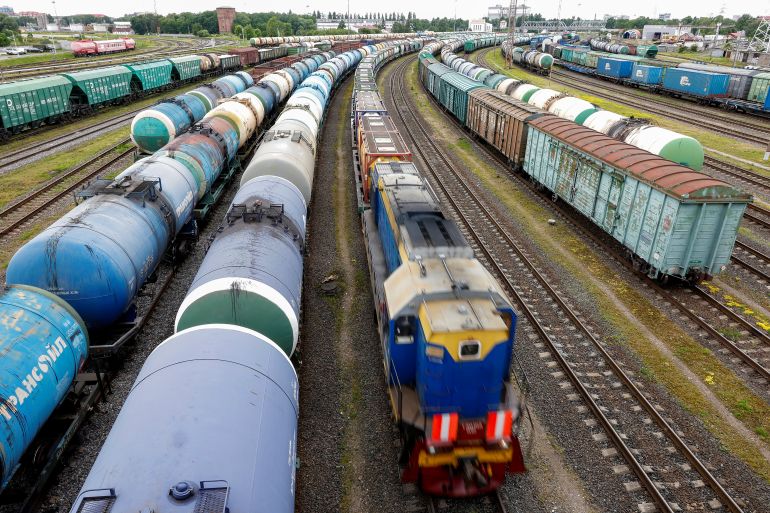Sanctions on Russia may not be working, we now know why
European businesses and third countries are actively circumventing sanctions, providing Russia with sanctioned goods and thus helping its war effort.

On February 25, 2022, a day after Russia undertook a full-scale invasion of Ukraine, the European Union introduced unprecedented sanctions against the aggressor. The measures were intended to send a clear signal to Moscow that there would be severe consequences for its actions.
The sanctions targeted Russian President Vladimir Putin’s inner circle, as well as Russian companies and several sectors of the Russian economy. In the following months, the sanctions regime against Russia was expanded with eight more instalments, hitting its most valuable exports to Europe – oil and gas – and curbing its access to products that could be used in its war on Ukraine.
Keep reading
list of 4 itemsMore than 50,000 Russians killed in Ukrainian ‘meat grinder’: Report
Ukraine says 17 killed in Russian missile attack on Chernihiv
Russia-Ukraine war: List of key events, day 783
By the looks of it, the EU will continue to impose new sanctions, as Russian aggression and war crimes show no sign of abating. But despite the wide-ranging measures imposed and Brussel’s commitment to uphold them, some observers are claiming that they have failed.
The Russian economy appears more resilient than expected and the Russian military retains the capacity to destroy civilian infrastructure and military targets and terrorise the Ukrainian population. What is more, sanctioned goods are still finding their way to Russia and to the battlefield in Ukraine.
If the sanctions are not working the way they ought to, it is because we are actively undermining them. A recently released report by Norway-based risk consultancy Corisk reveals how that is done.
Its analysis of customs data from 12 EU countries, Norway, the UK, the US and Japan shows that the circumvention of export sanctions on Russia amounted to an astonishing 8 billion euros ($8.5bn) in 2022.
Of the countries studied, Germany appears to be the largest exporter of sanctioned goods to Russia; the second largest is Lithuania. The two provide half of the Western goods Moscow should not have access to.
The research reveals that European businesses, and especially German ones, use third countries to sell their products to Russia. This is apparent from the analysis of the export data for sanctioned goods, including luxury items such as jewellery and perfumes, typically enjoyed by the elites in Moscow, cutting-edge technology, like advanced semiconductors and quantum computers, machinery and transportation equipment.
In early 2022, Western exports of these goods to Russia plummeted, but to its neighbours, they skyrocketed. Nearly half of this “parallel export” is channelled through Kazakhstan and the rest is divided between Georgia, Armenia, Kyrgyzstan and others.
Importantly, the list of sanctioned products includes dual-use goods that can be used for both civilian and military purposes, such as drones, vehicles and certain chemicals.
In a war zone, mid-sized trucks are crucial for transporting supplies to the front line, which is why such vehicles were put on the sanctions list. As a result, Germany’s export to Russia of diesel trucks in this weight class dropped to zero by May 2022. However, the sales of these same trucks to Armenia increased exponentially and reached levels five times what Germany sold to Russia previously by September.
Polyamides are another dual-use product that has made its way to Russia, breaking the sanctions regime. These chemicals are used in the manufacturing of body armour, military pilot flight vests and many other military and civilian items. Until June 2022, Germany exported virtually no polyamides to Kazakhstan. After the sanctions were introduced, Kazakhstani demand for these chemicals exploded and by October it was importing 200 tonnes from German producers.
Lithuania has also been exporting sanctioned goods to Russia, but through another route –Belarus. Despite hosting the Belarusian opposition and opposing President Alexander Lukashenko’s regime in Minsk, Vilnius seems to have increased its sales of vehicles to its neighbour 10-fold between May and September last year. Given that exports to Russia have dropped to zero and Belarusian demand for cars is unlikely to have increased so dramatically, it appears these goods are going to Russia.
While Belarus is a staunch supporter of Moscow and openly backs the Russian war on Ukraine, Kazakhstan has been reluctant to take sides. President Kassym-Jomart Tokayev has called for an end to the violence in Ukraine, refused to recognise the Russian annexation of Ukrainian territory and pledged to curb sanctions circumvention on Kazakhstani territory.
His government has reportedly introduced stricter customs control of electronic goods imported to Russia and is looking into online customs monitoring to track goods crossing the border. Whether these efforts will actually curb the flow of sanctioned goods or are merely cosmetic measures remains to be seen.
Relying on Kazakhstan and other Russian neighbours to control sanctions evasion seems unrealistic. It is up to the countries that have imposed these measures to make sure they are implemented.
The EU, for its part, should establish new export regimes for dual-use goods and war-critical goods. Members of the sanctions coalition should put together investigate task forces and enforce compliance using all legal tools available. The business community itself also has to play a role; it needs to embrace a compliance culture and stop turning a blind eye to sanctions evaders.
Making sure that sanctions are not just imposed but are actually thoroughly implemented is crucial at this stage of the war. Too many Ukrainians have lost their lives in the war already and many more are headed to the battlefield to defend their country and their freedom – and by extension Europe’s. We must not fail them.
The views expressed in this article are the authors’ own and do not necessarily reflect Al Jazeera’s editorial stance